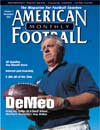AMERICAN FOOTBALL MONTHLY THE #1 RESOURCE FOR FOOTBALL COACHES
Article CategoriesAFM Magazine
|
A Wizard in the Land of OzTiny Washburn University head coach Tony DeMeo proves year-after-year that victories aren\'t always won on Saturdays and great coaches don\'t have to war houndstooth hatsby: Jamie DeMoney © More from this issue When Tony DeMeo left the tight confines of the East Coast for the wide-open plains of Topeka, Kan., and Washburn University in December 1993, what he found was pretty alarming. The school, though getting ready to begin its 103rd year playing the game, was one of the barren wastelands of college football. Five years had passed since the Ichabods last posted a winning record and the program was languishing through a 12-game losing streak. Even worse, DeMeo found only 29 players on the roster leftover from the previous regime, an equipment room with only 25 helmets adequate for use and a practice field without so much as a blocking sled on it. "It was so bad Kevorkian was the team doctor," quips DeMeo, sitting with his feet up on a conference room table a few minutes before a Monday practice earlier this season. A quick wit....The full article can only be seen by subscribers.
|
|
|||||||
| HOME |
MAGAZINE |
SUBSCRIBE | ONLINE COLUMNISTS | COACHING VIDEOS |
Copyright 2026, AmericanFootballMonthly.com
All Rights Reserved





